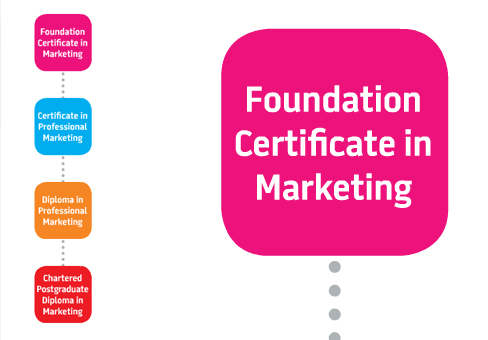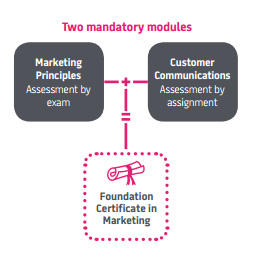Study spotlight on the new CIM Foundation Certificate in Marketing


 The Foundation Certificate in Marketing is an integral part of CIM’s professional qualifications, launched in late 2014. These qualifications have been enthusiastically received by employers, many of whom set CIM qualifications as a pre-requisite for any marketing job vacancy they advertise. These qualifications are also in demand from many leading Universities who have recently joined CIM’s Graduate Gateway scheme. This article provides an overview of the key features of the Foundation Certificate to keep our London members up to date.
The Foundation Certificate in Marketing is an integral part of CIM’s professional qualifications, launched in late 2014. These qualifications have been enthusiastically received by employers, many of whom set CIM qualifications as a pre-requisite for any marketing job vacancy they advertise. These qualifications are also in demand from many leading Universities who have recently joined CIM’s Graduate Gateway scheme. This article provides an overview of the key features of the Foundation Certificate to keep our London members up to date.
This month’s qualification spotlight has been compiled by Jon Twomey of Student Support Group, the organisation which provides a free advice helpline for London studying members on 01784 463057, sponsored by CIM’s Greater London Region Board. The group is one of CIM’s Accredited Study Centres. Over the years Student Support Group has helped over 20,000 marketers successfully gain their qualifications.
Who should be interested to discover more?
Whether you’re new to marketing or been around for a while, this overview should prove a helpful resource. If you are a senior marketer responsible for the performance and training of your team, it’s likely you qualified with CIM some time ago and might not be quite so familiar with our new suite of qualifications. This overview will put you firmly in the picture. If you’ve just started your career, you might be wondering what the fuss over CIM qualifications is all about since you’ve probably already got some business qualifications from college or university, so we’ll explain more.
Focus on the CIM Foundation Certificate in Marketing
This Level 3, entry level qualification provides the basic skills and knowledge required to understand marketing’s role in the organisation and to perform professionally. It’s the ideal CIM qualification if you are looking to move into marketing or are working in a marketing support role.
Who is it designed for? Entry requirements
 It is not necessary to have any previous experience or knowledge of marketing, however, if English isn’t your first language, you will also need to demonstrate you’ve achieved an English language qualification within the last two years. CIM will consider other equivalent alternatives.
It is not necessary to have any previous experience or knowledge of marketing, however, if English isn’t your first language, you will also need to demonstrate you’ve achieved an English language qualification within the last two years. CIM will consider other equivalent alternatives.
Why I signed up and how it has helped me get on in marketing
Sean Higgins is currently studying for the Foundation Certificate and explains his personal motivation for pursuing this qualification:
"Understanding how people think, behave and the psychology behind marketing has always interested me and as a young, 18-year-old marketer, CIM allows me to open up doors for my future. With the help of Student Support Group I have started my Foundation Certificate in Marketing while simultaneously studying for an Extended Diploma in Business. They have helped me better my understanding and expand my knowledge, and for this reason look forward to completing many more CIM qualifications in the future to enhance my career."
How many modules are there?
 There are two mandatory modules, Marketing Principles and Customer Communications. Successful completion of these two modules leads to the CIM Foundation Certificate in Marketing. You can study these in any order, though Jon recommends doing Marketing Principles first if you can. Each bite-sized module is an award in its own right, so you can spread out the study (and the costs) and study for one module at a time and build up to the full Foundation qualification later.
There are two mandatory modules, Marketing Principles and Customer Communications. Successful completion of these two modules leads to the CIM Foundation Certificate in Marketing. You can study these in any order, though Jon recommends doing Marketing Principles first if you can. Each bite-sized module is an award in its own right, so you can spread out the study (and the costs) and study for one module at a time and build up to the full Foundation qualification later.
Marketing Principles (mandatory)
This module covers the function of marketing and its role in an organisation, as well as how the marketing mix is used to satisfy customer needs.

The module is divided into three sections:
- Discovering marketing (30%)
- The marketing environment (45%)
- The marketing mix (35%).
What will I learn from this module?
By completing their studies, module students should be able to:
- Describe the role and function of marketing within organisations
- Explain the factors that influence consumer behaviour
- Identify the key components of the marketing environment
- Know how to collect relevant information about the marketing environment
- Describe the concept and elements of the marketing mix
- Know how the marketing mix is applied in different contextual setting
It is interesting to note the CIM command/action words typically used at Foundation level focus on skills like describing and explaining, with reference to CIM recognised theory of course.
How is the Marketing Principles module assessed?
All CIM assessment methods used are employer-driven, practitioner-based, relevant and appropriate for business needs. This module is assessed by an online test comprising 50 multiple-choice questions in 90 minutes. A few sample questions are posed below - how well did you do?
Sample online test questions (select only one answer per question)
1. Marketing can be defined as:
(a) selling all that you can make
(b) promoting what you make
(c) designing new products and selling them
(d) satisfying customers’ needs and wants
2. In order to satisfy customers in the long term, an organisation must:
(a) understand customer expectations
(b) produce a lot of cheap products
(c) use a lot of attractive advertising
(d) use sales promotions to drive demand for weaker products
3. The marketing department needs to communicate with other organisational departments in order that:
(a) sales targets are met
(b) suppliers are invoiced
(c) information about customers is communicated
(d) products are produced efficiently
Customer Communications (mandatory)
This module covers: the different customers that organisations have, and ways of communicating with those customers, through building a marketing communications plan.

This module is also divided into three sections:
- Who are customers? (30%)
- Communicating with customers (40%)
- Creating a marketing communications campaign (30%)
What will I learn from this module?
Upon completion of their studies, module students should be able to:
- Identify different types of customers
- Understand the nature and importance of customer relationships
- Outline the purpose and process of marketing communications
- Describe the range of different marketing communications tools available
- Develop an outline marketing communications campaign
- Illustrate how the marketing communications campaign will be put into practice
It is interesting to note the CIM command/action words used typically at Foundation level focus on identifying and describing, with reference to CIM recognised theory of course.
How is Customer Communications assessed?
This module is assessed by a seven-page assignment based on a given scenario and an organisation of choice.
Sample assignment brief: In your role within the marketing function of an organisation of your choice, your manager has asked you to prepare a report for senior management. The purpose of the report is to provide an understanding of the main elements of marketing communications and how they can be used in your organisation to engage with customers.
Task One - Prepare a presentation to explain the importance of segmentation and how it can be used to reach different types of customers. Required: 1a. Explain the benefits of segmentation, providing examples of how you could segment the customers in your organisation. Outline the difference between customers and consumers, and describe how you might use segmentation to target each in an appropriate way. (6 marks). 1b. Define the difference between B2B and B2C customers and explain how this affects their respective decision-making process. (4 marks). 1c. Identify TWO collaborative / partnership relationships that exist / could exist in your organisation. (2 marks).
How long will it take me to get qualified?
Each module has been calculated as carrying nine credits which equates to around 80 - 90 notional learning hours. This includes: tutor guided learning hours; practical and work-based learning; assessment preparation time; and assessment time.
When are the assessments delivered?
There are three assessment sessions per year. These take place at the end of March/beginning of April, the end of June and the beginning of December each year. Please see CIM Learning Zone for exact dates.
What’s next after the Foundation Certificate?
Take a look at the Certificate in Professional Marketing to develop a deeper understanding of marketing principles and practice. Alternatively, you could consider the CIM/CAM Diploma in Digital Marketing – as both are CIM Level 4 qualifications.
Any questions?
If you have any questions please contact one of our CIM training and qualification advisors at qualifications@cim.co.uk.
You can call the Student Support Group advice helpline which is free for CIM members in the Greater London region. The group also provides a range of help with assignments and exams, fees apply to some services.
Contact caroline@studentsupportgroup.co.uk or call Caroline on 01784 463057.

